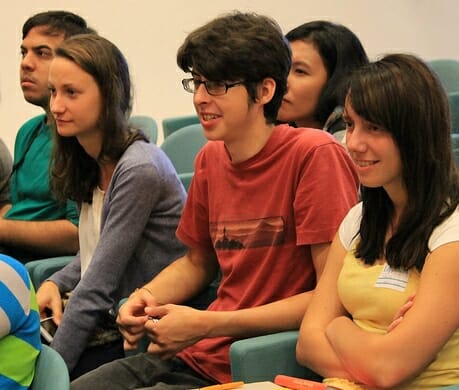
Oct 2, 2015 | Focolare Worldwide, Senza categoria
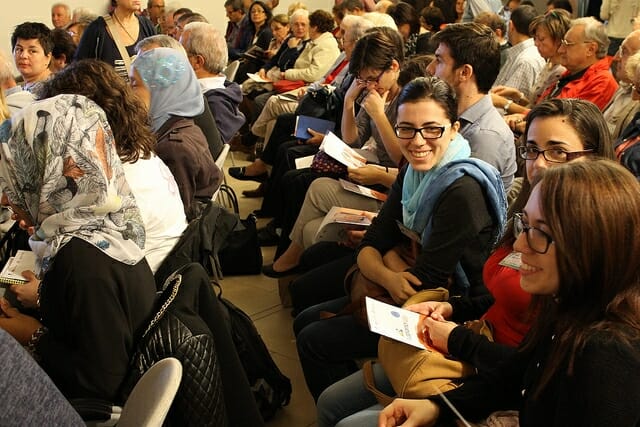 “Hosting the extraordinary in the ordinary things, training one’s perception to see the growth of the tree: without prophets, life would be a place of pessimism and not of hope which unites us.” In brief, this was what the economist, Luigino Bruni, said at the National Congress of the EoC networks during the 6th edition of LoppianoLab, attended by more than 2,000 participants from all over the country, and also others. Economy of Conmunion as a model to start with. “Only by regenerating relationships can we overcome fear and relaunch the economy: today, while mistrust and pessimism are holding back the relaunching of the economy in Europe and the Western world, we dare to look at the economy with the eyes of the African youth. – Bruni began – If we want to contribute to the rebirth of the economy, we have to regenerate the territories, families, relationships and rediscover and practice the civic virtues”. Not by chance, the title chosen was “Beyond fear. The culture of dialogue, active citizenship, civic economy,” for the 2015 edition of LoppianoLab, promoted by the Città Nuova Publishers, the Polo Lionello Bonfanti-Economy of Communion (EoC), Sophia University Institute (SUI) and the Loppiano International Centre (FI). Obviously there was a pressing call to the economic sector that involves about 200 businesses in Italy and 800 throughout the world, to adhere to and focus on man and his relational dimension in all their economic dealings, by practicing an Economy of Communion.
“Hosting the extraordinary in the ordinary things, training one’s perception to see the growth of the tree: without prophets, life would be a place of pessimism and not of hope which unites us.” In brief, this was what the economist, Luigino Bruni, said at the National Congress of the EoC networks during the 6th edition of LoppianoLab, attended by more than 2,000 participants from all over the country, and also others. Economy of Conmunion as a model to start with. “Only by regenerating relationships can we overcome fear and relaunch the economy: today, while mistrust and pessimism are holding back the relaunching of the economy in Europe and the Western world, we dare to look at the economy with the eyes of the African youth. – Bruni began – If we want to contribute to the rebirth of the economy, we have to regenerate the territories, families, relationships and rediscover and practice the civic virtues”. Not by chance, the title chosen was “Beyond fear. The culture of dialogue, active citizenship, civic economy,” for the 2015 edition of LoppianoLab, promoted by the Città Nuova Publishers, the Polo Lionello Bonfanti-Economy of Communion (EoC), Sophia University Institute (SUI) and the Loppiano International Centre (FI). Obviously there was a pressing call to the economic sector that involves about 200 businesses in Italy and 800 throughout the world, to adhere to and focus on man and his relational dimension in all their economic dealings, by practicing an Economy of Communion.  Dreaming of Africa. The workshop often referred to the EoC’s international congress held last May in Nairobi, the vitality of which was discussed by Geneviéve Sanze, an economist from Central Africa. In her continent, as of today, there are about 30 businesses that have joined the project which gave life to a network of support for the youth by the EoC entrepreneurs. People at times think that “Economy is a science of wealth: and believe that you have to go to the big cities to practice it, but with EoC, it has become the science of communion – she affirmed. Exchange of ideas, dialogue, and fraternity: in Nairobi we saw that every person brings a certain wealth within him that is all-inclusiveness and uniqueness, in the same way as the creative entrepreneur tries to enrich his ambience and his territory without catering to standards that are remote and far from the attention of the outskirts in need. And a totally new way of facing the topic of economy at international levels is to start from Africa, but even more so when considering the contribution Africa can give, rather than receive, thus giving trust and new drive to the Africans themselves, to empower their opportunities in their own countries.” Africa is a young continent, as testified to by Gloria and Melchiot, two African students enrolled in the Sophia University Institute in Loppiano: “Allowing the African youth to have their dreams signifies avoiding the phenomenon of immigration: so why don’t we open businesses in Africa, so that they can find jobs there?” Anouk Grevin, Economist (University of Nantes and Sophia University Institute), announced that “Two business projects have started up in Nairobi. The Catholic University Institute of Buea (CUIB) in Cameroon has announced the institution of a Degree in the Economy of Communion, and the start in 2017 of the project incubator, “Siobhan,” to support the birth of new businesses in Africa. The second project dedicated to François Neveux, French pioneer of the EoC, will bring together entrepreneurs from all over the world, and create a network of economic support and project design, addressing especially young entrepreneurs.” Source: Città Nuova
Dreaming of Africa. The workshop often referred to the EoC’s international congress held last May in Nairobi, the vitality of which was discussed by Geneviéve Sanze, an economist from Central Africa. In her continent, as of today, there are about 30 businesses that have joined the project which gave life to a network of support for the youth by the EoC entrepreneurs. People at times think that “Economy is a science of wealth: and believe that you have to go to the big cities to practice it, but with EoC, it has become the science of communion – she affirmed. Exchange of ideas, dialogue, and fraternity: in Nairobi we saw that every person brings a certain wealth within him that is all-inclusiveness and uniqueness, in the same way as the creative entrepreneur tries to enrich his ambience and his territory without catering to standards that are remote and far from the attention of the outskirts in need. And a totally new way of facing the topic of economy at international levels is to start from Africa, but even more so when considering the contribution Africa can give, rather than receive, thus giving trust and new drive to the Africans themselves, to empower their opportunities in their own countries.” Africa is a young continent, as testified to by Gloria and Melchiot, two African students enrolled in the Sophia University Institute in Loppiano: “Allowing the African youth to have their dreams signifies avoiding the phenomenon of immigration: so why don’t we open businesses in Africa, so that they can find jobs there?” Anouk Grevin, Economist (University of Nantes and Sophia University Institute), announced that “Two business projects have started up in Nairobi. The Catholic University Institute of Buea (CUIB) in Cameroon has announced the institution of a Degree in the Economy of Communion, and the start in 2017 of the project incubator, “Siobhan,” to support the birth of new businesses in Africa. The second project dedicated to François Neveux, French pioneer of the EoC, will bring together entrepreneurs from all over the world, and create a network of economic support and project design, addressing especially young entrepreneurs.” Source: Città Nuova
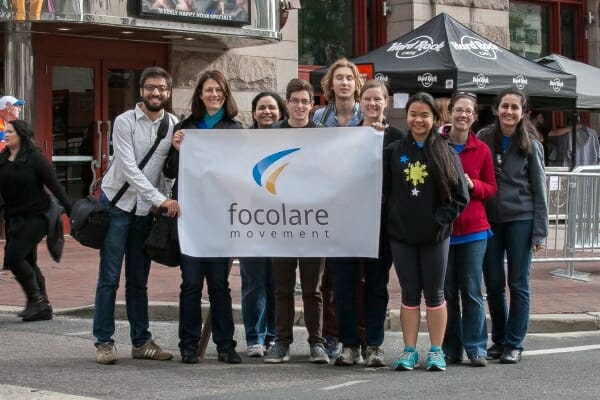
Oct 1, 2015 | Focolare Worldwide
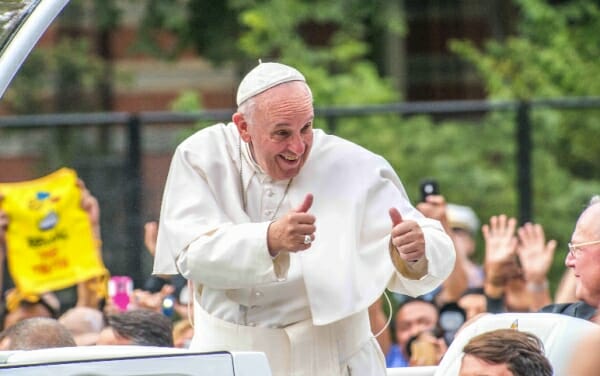
Photo © Renato Araujo

Photo © Andrea Re
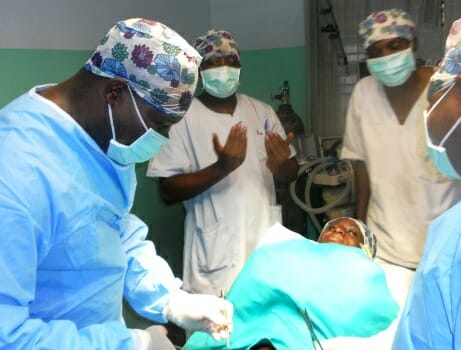
Sep 30, 2015 | Focolare Worldwide
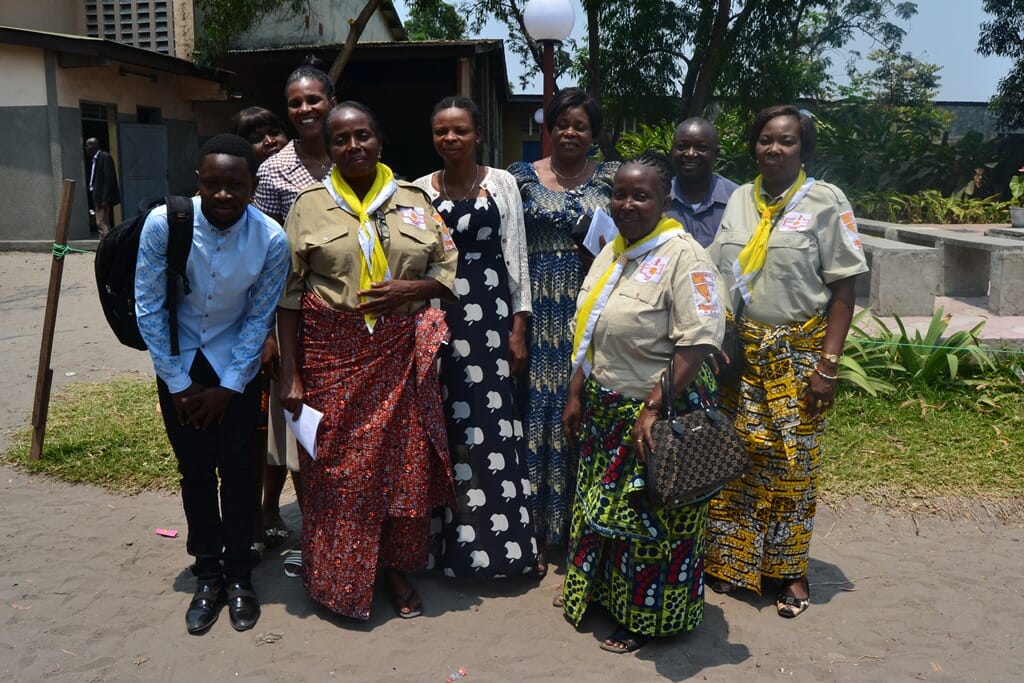 “One day we were closing, when at 4:30 p.m. a mother with a baby about 8 months old arrived for a blood sample withdrawal.” Aline M. is a nurse and a biologist in the university clinic of Kinshasa. In the Congo/DRC, the birth rate is very high, as is the mortality rate and the infant mortality rate. Life expectancy at birth and the average age of the population are both very low. “My colleagues had already closed the registration books and wanted to leave. But the words of the Gospel, which say to love one’s neighbour as oneself, came to my mind: ‘I have to welcome even this mother,’ I thought. I took a blood sample from the little one, and as I was finishing, the mother said to me with a firm voice, ‘God bless you, ma’am!”
“One day we were closing, when at 4:30 p.m. a mother with a baby about 8 months old arrived for a blood sample withdrawal.” Aline M. is a nurse and a biologist in the university clinic of Kinshasa. In the Congo/DRC, the birth rate is very high, as is the mortality rate and the infant mortality rate. Life expectancy at birth and the average age of the population are both very low. “My colleagues had already closed the registration books and wanted to leave. But the words of the Gospel, which say to love one’s neighbour as oneself, came to my mind: ‘I have to welcome even this mother,’ I thought. I took a blood sample from the little one, and as I was finishing, the mother said to me with a firm voice, ‘God bless you, ma’am!” 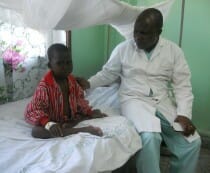 I was just able to convince a colleague from the blood blank to take this last emergency, when another serious problem presented itself. It was already 5:00 p.m. There was a mother in tears, who could not pay for health insurance, with 4-year-old child in her arms, afflicted by severe anemia. My colleague decidedly told me that it was no longer possible to accept anyone. ‘Otherwise I’ll lose my job,’ she exclaimed. I was moved by this suffering. I took a sheet of paper and attested in writing that I was responsible for the cost of the blood transfusion for this child. My colleague then accepted, and immediately gave the child the transfusion, saving his life. The child’s mother said to me: ‘God will return you the money. I am sure of it!’
I was just able to convince a colleague from the blood blank to take this last emergency, when another serious problem presented itself. It was already 5:00 p.m. There was a mother in tears, who could not pay for health insurance, with 4-year-old child in her arms, afflicted by severe anemia. My colleague decidedly told me that it was no longer possible to accept anyone. ‘Otherwise I’ll lose my job,’ she exclaimed. I was moved by this suffering. I took a sheet of paper and attested in writing that I was responsible for the cost of the blood transfusion for this child. My colleague then accepted, and immediately gave the child the transfusion, saving his life. The child’s mother said to me: ‘God will return you the money. I am sure of it!’  Returning home, I asked myself: ‘Why is it that I met two mothers with such suffering children right at closing time?’ I read the Word of Life, a sentence from the Gospel, and I found comfort. The next week, I received an invitation from my health service. From among my colleagues I was chosen for a 3-day professional training course. The financial contribution given to me for my participation was $150 US dollars! There was God’s answer. For having paid $25 US dollars for the blood transfusion, I received two blessings plus this amount which now allows me to also pay the scholastic fees for my children.” A.M. – Kinshasa, Congo/DRC
Returning home, I asked myself: ‘Why is it that I met two mothers with such suffering children right at closing time?’ I read the Word of Life, a sentence from the Gospel, and I found comfort. The next week, I received an invitation from my health service. From among my colleagues I was chosen for a 3-day professional training course. The financial contribution given to me for my participation was $150 US dollars! There was God’s answer. For having paid $25 US dollars for the blood transfusion, I received two blessings plus this amount which now allows me to also pay the scholastic fees for my children.” A.M. – Kinshasa, Congo/DRC
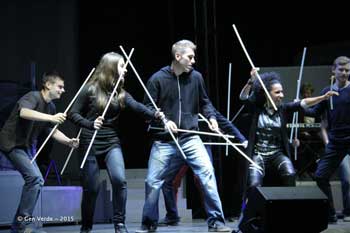
Sep 29, 2015 | Focolare Worldwide
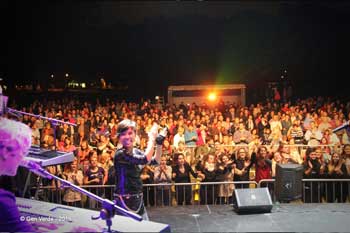 “Start Now!” That is, start here and now, to build authentic relationships and to generate trust. It is an invitation worth its weight in gold, you might say, and it was the title Gen Verde chose for the concert/workshop brought to the stage of the Tágas Tér Festival, on September 25th in Szeged, Hungary. The protagonists in these eight workshops, along with the artists, were 120 teens from two high schools, one of which is a professional institute frequented by many students who have difficult family situations. “Tágas Tér, which literally means, ‘open space,’” explains one of the organizers, “is in fact a big ecumenical meeting which exposes the network of hundreds of activities in the world for civic solidarity. Szeged is 15 km from the Hungarian border with Serbia, and therefore, many people were present at the concert who experience the passage of thousands of immigrants daily, with the sea of questions and sorrow that comes along with it.
“Start Now!” That is, start here and now, to build authentic relationships and to generate trust. It is an invitation worth its weight in gold, you might say, and it was the title Gen Verde chose for the concert/workshop brought to the stage of the Tágas Tér Festival, on September 25th in Szeged, Hungary. The protagonists in these eight workshops, along with the artists, were 120 teens from two high schools, one of which is a professional institute frequented by many students who have difficult family situations. “Tágas Tér, which literally means, ‘open space,’” explains one of the organizers, “is in fact a big ecumenical meeting which exposes the network of hundreds of activities in the world for civic solidarity. Szeged is 15 km from the Hungarian border with Serbia, and therefore, many people were present at the concert who experience the passage of thousands of immigrants daily, with the sea of questions and sorrow that comes along with it. 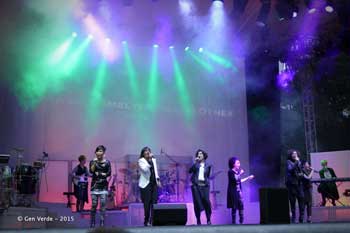 “On the Other Side”: During the concert, many songs were heard from “On the Other Side,” the latest album by Gen Verde, released less than a month ago. But what is “the other side”? is a spontaneous question many ask themselves. “It’s the person I have in front of me, the person who thinks differently than I; the person I don’t admire or even like,” explains Adriana Garcia, the group’s bass player from Mexico. A powerful show, engaging and at the same time capable of questioning positions, opinions and lifestyles as someone has said. Because what emerges from the music and the lyrics is the certainty that the solution to a broken world, divided by walls, comes from understanding the richness inherent in diversity. Among the eleven songs on the album there is the story of the difficult progress of an entire people in the piece “Voz de la Verdad,” about the Salvadorian bishop, Oscar Romero, or the very current and relevant song about the division of the two Koreas, built on K-pop melodies, almost as if to say that even among young Koreans the wound has not yet healed. “They are stories that do not permit us to fall into indifference,” comments one girl, “or to forget our brothers and sisters from whom we are separated by a border. We have felt strongly called even to give our lives for justice.” “Needless to say, the most powerful moment of the concert was the song “Chi piange per te,” (“Who cries for you”) a sweet lullaby dedicated to a baby girl entombed in the waters of the Sicilian Canal, perhaps because of the situation our country is living now with the immigration issue,” confided a friend who works with the media. And a Pastor of the Reformed Church, Gábor Czagány, one of the organizers of the Festival, stated: “What struck me the most were the faces of the young people from the schools that took part in the workshops. There was joy, participation, commitment. You could intuit the weight of the experience they had had: seven days that left their mark. Now it’s up to us to keep all this from getting lost or going to waste.”
“On the Other Side”: During the concert, many songs were heard from “On the Other Side,” the latest album by Gen Verde, released less than a month ago. But what is “the other side”? is a spontaneous question many ask themselves. “It’s the person I have in front of me, the person who thinks differently than I; the person I don’t admire or even like,” explains Adriana Garcia, the group’s bass player from Mexico. A powerful show, engaging and at the same time capable of questioning positions, opinions and lifestyles as someone has said. Because what emerges from the music and the lyrics is the certainty that the solution to a broken world, divided by walls, comes from understanding the richness inherent in diversity. Among the eleven songs on the album there is the story of the difficult progress of an entire people in the piece “Voz de la Verdad,” about the Salvadorian bishop, Oscar Romero, or the very current and relevant song about the division of the two Koreas, built on K-pop melodies, almost as if to say that even among young Koreans the wound has not yet healed. “They are stories that do not permit us to fall into indifference,” comments one girl, “or to forget our brothers and sisters from whom we are separated by a border. We have felt strongly called even to give our lives for justice.” “Needless to say, the most powerful moment of the concert was the song “Chi piange per te,” (“Who cries for you”) a sweet lullaby dedicated to a baby girl entombed in the waters of the Sicilian Canal, perhaps because of the situation our country is living now with the immigration issue,” confided a friend who works with the media. And a Pastor of the Reformed Church, Gábor Czagány, one of the organizers of the Festival, stated: “What struck me the most were the faces of the young people from the schools that took part in the workshops. There was joy, participation, commitment. You could intuit the weight of the experience they had had: seven days that left their mark. Now it’s up to us to keep all this from getting lost or going to waste.”  Young people offer hope for unity—Alessandra Pasquale, actress and singer in Gen Verde, is eager to clarify: “Our job is not to go on stage, sing, show off and then depart: we cannot exclude the building of authentic relationships with people, or exclude feeling what the people who come to our concerts experience, in what waters the teens with whom we do the workshops navigate.” It is for this reason that the video-interviews of the young participants of the workshops are projected before the beginning of the concert at Szeged, and were an integral part of the show, because these young people had in fact helped build it. Here are a few words from the teens: “The project, ‘Start Now!’ opened my eyes: it taught me not to judge foreigners. And this takes work: it takes tenacity and trust.” “I learned how we should pay attention to one another.” “I understood the importance of keeping a community together and that to be a family, humanity needs the collaboration of each one of us.” “I am very happy that my school participated in the project, “Start Now!” with the other school. In the beginning we didn’t know each other; it took time, but then we earned each other’s trust and now I can say that we move as a single person, we are absolutely happy.”
Young people offer hope for unity—Alessandra Pasquale, actress and singer in Gen Verde, is eager to clarify: “Our job is not to go on stage, sing, show off and then depart: we cannot exclude the building of authentic relationships with people, or exclude feeling what the people who come to our concerts experience, in what waters the teens with whom we do the workshops navigate.” It is for this reason that the video-interviews of the young participants of the workshops are projected before the beginning of the concert at Szeged, and were an integral part of the show, because these young people had in fact helped build it. Here are a few words from the teens: “The project, ‘Start Now!’ opened my eyes: it taught me not to judge foreigners. And this takes work: it takes tenacity and trust.” “I learned how we should pay attention to one another.” “I understood the importance of keeping a community together and that to be a family, humanity needs the collaboration of each one of us.” “I am very happy that my school participated in the project, “Start Now!” with the other school. In the beginning we didn’t know each other; it took time, but then we earned each other’s trust and now I can say that we move as a single person, we are absolutely happy.”
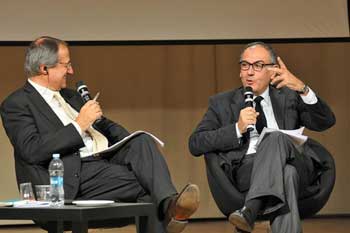
Sep 28, 2015 | Focolare Worldwide
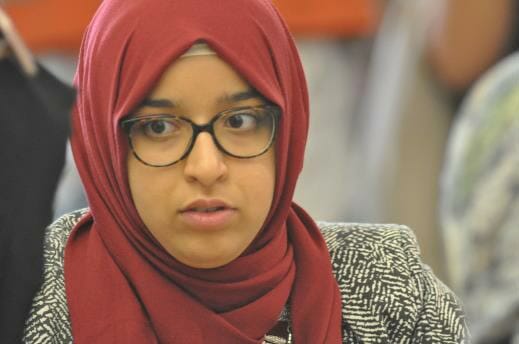 Ideas such as involvement as the method; the ability to dialogue respecting not only the differing ideas and convictions of others, but also their sufferings; biodiversity that values cultural riches; seeking greater justice; transforming indignation into collective action for changing the world – these were the main values behind the ten projects and initiatives that brought out the vitality of Italian society today. It concluded with a variety of voices, projects and events that started from the bottom of Italian society, including the sixth edition of LoppianoLab. More than 2,000 attendees emphasised the importance of sharing and dialogue amongst business leaders, politicians, educators, citizens, young people, communicators and local administrators – civil society in its diversity of expressions.
Ideas such as involvement as the method; the ability to dialogue respecting not only the differing ideas and convictions of others, but also their sufferings; biodiversity that values cultural riches; seeking greater justice; transforming indignation into collective action for changing the world – these were the main values behind the ten projects and initiatives that brought out the vitality of Italian society today. It concluded with a variety of voices, projects and events that started from the bottom of Italian society, including the sixth edition of LoppianoLab. More than 2,000 attendees emphasised the importance of sharing and dialogue amongst business leaders, politicians, educators, citizens, young people, communicators and local administrators – civil society in its diversity of expressions.
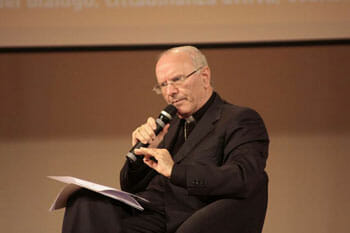
Msgr. Nunzio Galantino, Secretary General of the Italian Bishops Conference
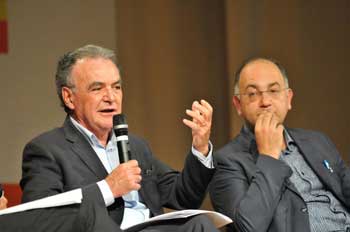
Luigi Bobba, Under Secretary of the Ministry of Social Politics and Work – Luigino Bruni, Economist

Vincenzo Morgante, Director of the TGR RAI – Michele Zanzucchi, Director Città Nuova
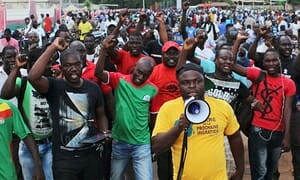
Sep 23, 2015 | Focolare Worldwide
 “Ever since the coup d’etat last Thursday, 17 September– we are all still at home: the schools, offices, and shops are all closed. Petrol and food are running out and whatever is available, costs double,” explains Aurora De Oliveira of the Focolare in Bobo-Dioulasso, the second city of Burkina Faso. The protest here is felt, but not as strongly as in the capital, Ouagadougou (population of 1.5 million), where the main events of last week came about and where more than 100 people were wounded and at least ten have died. “These are determined people who do not wish to be crushed. In the big cities of Burkina Faso everyone participated in demonstrations, but peaceful ones. Undoubtedly, all are afraid, since war could explode any time now.” Jacques Sawadogo of the focolare community in the capital wrote: “The activities in Ouaga – where the army came – have slowed down. The banks, shops and stations have closed. Only small self-supporting activities have continued, like those of the Movement’s members in Ouagadougou. We try to keep contact via e-mail or telephone. We are trying our best to be peacemakers in words and actions.” We spoke on the phone also with Fr. Sylvestre Sanou, general vicar of the diocese of Bobo-Dioulasso. The situation is in constant evolution and we fear it may degenerate. “There’s a general strike throughout the country – Fr. Sylvestre continued – In reality it was not really a coup d’etat. It was a raid conducted by a small group of the Presidential Guards headed by General Diendéré, a close ally of former president, Blaise Compaoré, who rose to power in 1987 with a small coup d’etat and was forced to escape after 27 years, and only in October 2014, after days of protests. Since then he has taken refuge in the Ivory Coast. “It seems that Generale Diendéré has tried to negotiate for his immunity, after having been President Compaoré’s right-hand man.” We are, therefore, not dealing with a religious conflict between Muslims (50%), Christians (30%) or Traditional Religions (20%) but with a political situation. “The army seems to side with the population and the governors of the various regions are also against “coups,” and even Diendéré’s house was burnt down. Violence generates violence,” Fr. Sylvestre continued. “On 22 September we were all holding our breaths for the ultimatum of the army which entered the capital from four cities. The political future of the country is uncertain, despite the mediation of the Presidents of Benin and Senegal, on behalf of the Economic Community of West African States (CEDEAO) and the return of the transitory President of Burkina Faso, Michel Kafando and also the Prime Minister, Isaac Zida (arrested and then released).” “I had just returned from a stay in the Mariapolis “Victoria,” the town of the Focolare Movement in the Ivory Coast, and found myself in this situation,” concluded Fr. Sanou. ”They blocked the undergoing process of dialogue between the political parties which had tried to find common ground. But all blew up. Let us pray that a solution emerges without bloodshed and also quickly. In the meantime, we have started with the priests, religious and catechists of the diocese and also with our bishop, the pastoral visits programmed before these events. We feel the importance of going ahead and praying for our people and our country.” “How are we all taking this? At the start we were angry and disappointed– Aurora De Oliveira confided – since after the 2014 events the political situation was coming along well. Just a step away from elections, programmed for 11 October (and now moved to 22 November), and here comes an armed group to spoil it all. This was my first reaction, and we felt the need to protest. The next step was to see in this suffering the countenance of Jesus Forsaken, and thus try to strengthen unity among us all in order to transmit peace and forgiveness. We tried to contact all those who share our spirituality of unity, because love must overcome all.” While the meeting in Rome of delegates of the Movement from all over the world has started, and makes the hopes and sufferings of people all over the world particularly felt, the President of the Focolare, Maria Voce wrote to the community of Burkina Faso: “We shall continue to pray and live in greater unity with all of you, certain that Mary will protect us all.” https://vimeo.com/140074710
“Ever since the coup d’etat last Thursday, 17 September– we are all still at home: the schools, offices, and shops are all closed. Petrol and food are running out and whatever is available, costs double,” explains Aurora De Oliveira of the Focolare in Bobo-Dioulasso, the second city of Burkina Faso. The protest here is felt, but not as strongly as in the capital, Ouagadougou (population of 1.5 million), where the main events of last week came about and where more than 100 people were wounded and at least ten have died. “These are determined people who do not wish to be crushed. In the big cities of Burkina Faso everyone participated in demonstrations, but peaceful ones. Undoubtedly, all are afraid, since war could explode any time now.” Jacques Sawadogo of the focolare community in the capital wrote: “The activities in Ouaga – where the army came – have slowed down. The banks, shops and stations have closed. Only small self-supporting activities have continued, like those of the Movement’s members in Ouagadougou. We try to keep contact via e-mail or telephone. We are trying our best to be peacemakers in words and actions.” We spoke on the phone also with Fr. Sylvestre Sanou, general vicar of the diocese of Bobo-Dioulasso. The situation is in constant evolution and we fear it may degenerate. “There’s a general strike throughout the country – Fr. Sylvestre continued – In reality it was not really a coup d’etat. It was a raid conducted by a small group of the Presidential Guards headed by General Diendéré, a close ally of former president, Blaise Compaoré, who rose to power in 1987 with a small coup d’etat and was forced to escape after 27 years, and only in October 2014, after days of protests. Since then he has taken refuge in the Ivory Coast. “It seems that Generale Diendéré has tried to negotiate for his immunity, after having been President Compaoré’s right-hand man.” We are, therefore, not dealing with a religious conflict between Muslims (50%), Christians (30%) or Traditional Religions (20%) but with a political situation. “The army seems to side with the population and the governors of the various regions are also against “coups,” and even Diendéré’s house was burnt down. Violence generates violence,” Fr. Sylvestre continued. “On 22 September we were all holding our breaths for the ultimatum of the army which entered the capital from four cities. The political future of the country is uncertain, despite the mediation of the Presidents of Benin and Senegal, on behalf of the Economic Community of West African States (CEDEAO) and the return of the transitory President of Burkina Faso, Michel Kafando and also the Prime Minister, Isaac Zida (arrested and then released).” “I had just returned from a stay in the Mariapolis “Victoria,” the town of the Focolare Movement in the Ivory Coast, and found myself in this situation,” concluded Fr. Sanou. ”They blocked the undergoing process of dialogue between the political parties which had tried to find common ground. But all blew up. Let us pray that a solution emerges without bloodshed and also quickly. In the meantime, we have started with the priests, religious and catechists of the diocese and also with our bishop, the pastoral visits programmed before these events. We feel the importance of going ahead and praying for our people and our country.” “How are we all taking this? At the start we were angry and disappointed– Aurora De Oliveira confided – since after the 2014 events the political situation was coming along well. Just a step away from elections, programmed for 11 October (and now moved to 22 November), and here comes an armed group to spoil it all. This was my first reaction, and we felt the need to protest. The next step was to see in this suffering the countenance of Jesus Forsaken, and thus try to strengthen unity among us all in order to transmit peace and forgiveness. We tried to contact all those who share our spirituality of unity, because love must overcome all.” While the meeting in Rome of delegates of the Movement from all over the world has started, and makes the hopes and sufferings of people all over the world particularly felt, the President of the Focolare, Maria Voce wrote to the community of Burkina Faso: “We shall continue to pray and live in greater unity with all of you, certain that Mary will protect us all.” https://vimeo.com/140074710

 “Hosting the extraordinary in the ordinary things, training one’s perception to see the growth of the tree: without prophets, life would be a place of pessimism and not of hope which unites us.” In brief, this was what the economist, Luigino Bruni, said at the National Congress of the EoC networks during the 6th edition of LoppianoLab, attended by more than 2,000 participants from all over the country, and also others. Economy of Conmunion as a model to start with. “Only by regenerating relationships can we overcome fear and relaunch the economy: today, while mistrust and pessimism are holding back the relaunching of the economy in Europe and the Western world, we dare to look at the economy with the eyes of the African youth. – Bruni began – If we want to contribute to the rebirth of the economy, we have to regenerate the territories, families, relationships and rediscover and practice the civic virtues”. Not by chance, the title chosen was “Beyond fear. The culture of dialogue, active citizenship, civic economy,” for the 2015 edition of LoppianoLab, promoted by the Città Nuova Publishers, the Polo Lionello Bonfanti-Economy of Communion (EoC), Sophia University Institute (SUI) and the Loppiano International Centre (FI). Obviously there was a pressing call to the economic sector that involves about 200 businesses in Italy and 800 throughout the world, to adhere to and focus on man and his relational dimension in all their economic dealings, by practicing an Economy of Communion.
“Hosting the extraordinary in the ordinary things, training one’s perception to see the growth of the tree: without prophets, life would be a place of pessimism and not of hope which unites us.” In brief, this was what the economist, Luigino Bruni, said at the National Congress of the EoC networks during the 6th edition of LoppianoLab, attended by more than 2,000 participants from all over the country, and also others. Economy of Conmunion as a model to start with. “Only by regenerating relationships can we overcome fear and relaunch the economy: today, while mistrust and pessimism are holding back the relaunching of the economy in Europe and the Western world, we dare to look at the economy with the eyes of the African youth. – Bruni began – If we want to contribute to the rebirth of the economy, we have to regenerate the territories, families, relationships and rediscover and practice the civic virtues”. Not by chance, the title chosen was “Beyond fear. The culture of dialogue, active citizenship, civic economy,” for the 2015 edition of LoppianoLab, promoted by the Città Nuova Publishers, the Polo Lionello Bonfanti-Economy of Communion (EoC), Sophia University Institute (SUI) and the Loppiano International Centre (FI). Obviously there was a pressing call to the economic sector that involves about 200 businesses in Italy and 800 throughout the world, to adhere to and focus on man and his relational dimension in all their economic dealings, by practicing an Economy of Communion.  Dreaming of Africa. The workshop often referred to the EoC’s international congress held last May in Nairobi, the vitality of which was discussed by Geneviéve Sanze, an economist from Central Africa. In her continent, as of today, there are about 30 businesses that have joined the project which gave life to a network of support for the youth by the EoC entrepreneurs. People at times think that “Economy is a science of wealth: and believe that you have to go to the big cities to practice it, but with EoC, it has become the science of communion – she affirmed. Exchange of ideas, dialogue, and fraternity: in Nairobi we saw that every person brings a certain wealth within him that is all-inclusiveness and uniqueness, in the same way as the creative entrepreneur tries to enrich his ambience and his territory without catering to standards that are remote and far from the attention of the outskirts in need. And a totally new way of facing the topic of economy at international levels is to start from Africa, but even more so when considering the contribution Africa can give, rather than receive, thus giving trust and new drive to the Africans themselves, to empower their opportunities in their own countries.” Africa is a young continent, as testified to by Gloria and Melchiot, two African students enrolled in the Sophia University Institute in Loppiano: “Allowing the African youth to have their dreams signifies avoiding the phenomenon of immigration: so why don’t we open businesses in Africa, so that they can find jobs there?” Anouk Grevin, Economist (University of Nantes and Sophia University Institute), announced that “Two business projects have started up in Nairobi. The Catholic University Institute of Buea (CUIB) in Cameroon has announced the institution of a Degree in the Economy of Communion, and the start in 2017 of the project incubator, “Siobhan,” to support the birth of new businesses in Africa. The second project dedicated to François Neveux, French pioneer of the EoC, will bring together entrepreneurs from all over the world, and create a network of economic support and project design, addressing especially young entrepreneurs.” Source: Città Nuova
Dreaming of Africa. The workshop often referred to the EoC’s international congress held last May in Nairobi, the vitality of which was discussed by Geneviéve Sanze, an economist from Central Africa. In her continent, as of today, there are about 30 businesses that have joined the project which gave life to a network of support for the youth by the EoC entrepreneurs. People at times think that “Economy is a science of wealth: and believe that you have to go to the big cities to practice it, but with EoC, it has become the science of communion – she affirmed. Exchange of ideas, dialogue, and fraternity: in Nairobi we saw that every person brings a certain wealth within him that is all-inclusiveness and uniqueness, in the same way as the creative entrepreneur tries to enrich his ambience and his territory without catering to standards that are remote and far from the attention of the outskirts in need. And a totally new way of facing the topic of economy at international levels is to start from Africa, but even more so when considering the contribution Africa can give, rather than receive, thus giving trust and new drive to the Africans themselves, to empower their opportunities in their own countries.” Africa is a young continent, as testified to by Gloria and Melchiot, two African students enrolled in the Sophia University Institute in Loppiano: “Allowing the African youth to have their dreams signifies avoiding the phenomenon of immigration: so why don’t we open businesses in Africa, so that they can find jobs there?” Anouk Grevin, Economist (University of Nantes and Sophia University Institute), announced that “Two business projects have started up in Nairobi. The Catholic University Institute of Buea (CUIB) in Cameroon has announced the institution of a Degree in the Economy of Communion, and the start in 2017 of the project incubator, “Siobhan,” to support the birth of new businesses in Africa. The second project dedicated to François Neveux, French pioneer of the EoC, will bring together entrepreneurs from all over the world, and create a network of economic support and project design, addressing especially young entrepreneurs.” Source: Città Nuova



 “One day we were closing, when at 4:30 p.m. a mother with a baby about 8 months old arrived for a blood sample withdrawal.” Aline M. is a nurse and a biologist in the university clinic of Kinshasa. In the Congo/DRC, the birth rate is very high, as is the mortality rate and the infant mortality rate. Life expectancy at birth and the average age of the population are both very low. “My colleagues had already closed the registration books and wanted to leave. But the words of the Gospel, which say to love one’s neighbour as oneself, came to my mind: ‘I have to welcome even this mother,’ I thought. I took a blood sample from the little one, and as I was finishing, the mother said to me with a firm voice, ‘God bless you, ma’am!”
“One day we were closing, when at 4:30 p.m. a mother with a baby about 8 months old arrived for a blood sample withdrawal.” Aline M. is a nurse and a biologist in the university clinic of Kinshasa. In the Congo/DRC, the birth rate is very high, as is the mortality rate and the infant mortality rate. Life expectancy at birth and the average age of the population are both very low. “My colleagues had already closed the registration books and wanted to leave. But the words of the Gospel, which say to love one’s neighbour as oneself, came to my mind: ‘I have to welcome even this mother,’ I thought. I took a blood sample from the little one, and as I was finishing, the mother said to me with a firm voice, ‘God bless you, ma’am!” 

 “Start Now!” That is, start here and now, to build authentic relationships and to generate trust. It is an invitation worth its weight in gold, you might say, and it was the title
“Start Now!” That is, start here and now, to build authentic relationships and to generate trust. It is an invitation worth its weight in gold, you might say, and it was the title “On the Other Side”: During the concert, many songs were heard from “
“On the Other Side”: During the concert, many songs were heard from “
 Ideas such as involvement as the method; the ability to dialogue respecting not only the differing ideas and convictions of others, but also their sufferings; biodiversity that values cultural riches; seeking greater justice; transforming indignation into collective action for changing the world – these were the main values behind the ten projects and initiatives that brought out the vitality of Italian society today. It concluded with a variety of voices, projects and events that started from the bottom of Italian society, including the sixth edition of
Ideas such as involvement as the method; the ability to dialogue respecting not only the differing ideas and convictions of others, but also their sufferings; biodiversity that values cultural riches; seeking greater justice; transforming indignation into collective action for changing the world – these were the main values behind the ten projects and initiatives that brought out the vitality of Italian society today. It concluded with a variety of voices, projects and events that started from the bottom of Italian society, including the sixth edition of 

